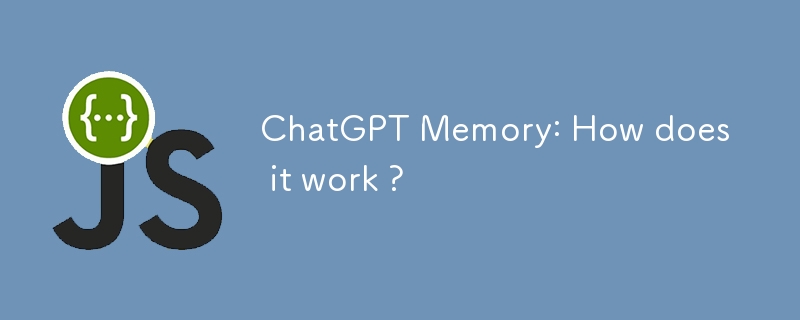ChatGPT 記憶體:它是如何運作的?

曾經希望你的人工智慧能夠記住你更喜歡簡短、直接的答案嗎?還是您喜歡對某些主題進行更詳細的答覆?人工智慧記憶使這成為可能,讓系統回憶您的偏好並適應不同的對話。
在 LLMChat,我們一直致力於透過讓 AI 更聰明、更個人化來打造更直覺的 AI 聊天體驗。我們實現這一目標的關鍵方法之一是賦予人工智慧記住的能力。
人工智慧記憶的工作原理
人工智慧記憶體儲存用戶特定的訊息,以個性化未來的互動。它利用函數呼叫方法,在需要新增、更新或刪除新資訊時觸發特定操作。例如,如果您告訴人工智慧您更喜歡簡潔的答案,它會記住這一點並在以後的聊天中調整其回應。
這是我們用來管理記憶體的模式:
const memoryToolSchema = z.object({
memory: z.array(
z.string().describe("Key information about the user")
).describe("New info to be added or updated"),
question: z.string().describe("The user's request"),
});
記憶功能的作用
讓我們來看看人工智慧記憶系統的核心。當提供新資訊(例如使用者偏好)時,我們的 DynamicStructuredTool 可確保 AI 動態更新或新增必要的詳細資訊。下面是它的工作原理的一瞥:
const memoryFunction = (context: ToolExecutionContext) => {
return new DynamicStructuredTool({
name: "memory",
description: "Manages user preferences and adapts interactions...",
schema: memoryToolSchema,
func: async ({ memory, question }) => {
const existingMemories = context.preferences?.memories || [];
const chain = RunnableSequence.from([
PromptTemplate.fromTemplate(`
User request: "{question}"
New info: {new_memory}
Existing memories: {existing_memory}
Update memories:
1. Update existing details
2. Remove if necessary
3. Add new unique memories`),
context.model,
memoryParser,
]);
const response = await chain.invoke({
new_memory: memory.join("\n"),
existing_memory: existingMemories.join("\n"),
question: question,
});
context.updatePreferences?.({ memories: response.memories });
return question;
},
});
};
此功能可確保人工智慧持續適應使用者偏好,使每次互動都感覺量身定制且更相關。
為什麼記憶很重要
人工智慧記憶透過使互動更加個人化來增強使用者體驗。無論是記住您喜歡的答案、追蹤正在進行的項目,還是了解您的偏好,記憶都可以讓人工智慧更聰明地運作。它還為用戶提供了控制權,讓他們可以管理記住的內容、更新偏好設定或根據需要清除所有內容。
// Example: Updating user preferences in real-time
context.updatePreferences?.({
memories: response.memories,
});
結論
記憶讓人工智慧不僅僅是一個工具——它成為一個適應你的伴侶。透過使用函數呼叫方法,我們為動態和個人化對話開啟了新的可能性。在 LLMChat,我們對記憶如何改變 AI 互動、使它們變得更聰明、更像人類感到興奮。
-
 為什麼在我的Linux服務器上安裝Archive_Zip後,我找不到“ class \” class \'ziparchive \'錯誤?class'ziparchive'在Linux Server上安裝Archive_zip時找不到錯誤 commant in lin ins in cland ins in lin.11 on a lin.1 in a lin.11錯誤:致命錯誤:在... cass中找不到類z...程式設計 發佈於2025-07-15
為什麼在我的Linux服務器上安裝Archive_Zip後,我找不到“ class \” class \'ziparchive \'錯誤?class'ziparchive'在Linux Server上安裝Archive_zip時找不到錯誤 commant in lin ins in cland ins in lin.11 on a lin.1 in a lin.11錯誤:致命錯誤:在... cass中找不到類z...程式設計 發佈於2025-07-15 -
 您如何在Laravel Blade模板中定義變量?在Laravel Blade模板中使用Elegance 在blade模板中如何分配變量對於存儲以後使用的數據至關重要。在使用“ {{}}”分配變量的同時,它可能並不總是是最優雅的解決方案。 幸運的是,Blade通過@php Directive提供了一種更優雅的方法: $ old_sectio...程式設計 發佈於2025-07-15
您如何在Laravel Blade模板中定義變量?在Laravel Blade模板中使用Elegance 在blade模板中如何分配變量對於存儲以後使用的數據至關重要。在使用“ {{}}”分配變量的同時,它可能並不總是是最優雅的解決方案。 幸運的是,Blade通過@php Directive提供了一種更優雅的方法: $ old_sectio...程式設計 發佈於2025-07-15 -
 C++20 Consteval函數中模板參數能否依賴於函數參數?[ consteval函數和模板參數依賴於函數參數在C 17中,模板參數不能依賴一個函數參數,因為編譯器仍然需要對非contexexpr futcoriations contim at contexpr function進行評估。 compile time。 C 20引入恆定函數,必須在編譯時進...程式設計 發佈於2025-07-15
C++20 Consteval函數中模板參數能否依賴於函數參數?[ consteval函數和模板參數依賴於函數參數在C 17中,模板參數不能依賴一個函數參數,因為編譯器仍然需要對非contexexpr futcoriations contim at contexpr function進行評估。 compile time。 C 20引入恆定函數,必須在編譯時進...程式設計 發佈於2025-07-15 -
 Java中Lambda表達式為何需要“final”或“有效final”變量?Lambda Expressions Require "Final" or "Effectively Final" VariablesThe error message "Variable used in lambda expression shou...程式設計 發佈於2025-07-15
Java中Lambda表達式為何需要“final”或“有效final”變量?Lambda Expressions Require "Final" or "Effectively Final" VariablesThe error message "Variable used in lambda expression shou...程式設計 發佈於2025-07-15 -
 C++成員函數指針正確傳遞方法如何將成員函數置於c [&& && && && && && && && && && &&&&&&&&&&&&&&&&&&&&&&&華儀的函數時,在接受成員函數指針的函數時,要在函數上既要提供指針又可以提供指針和指針到函數的函數。需要具有一定簽名的功能指針。要通過成員函數,您需要同時提供對象指針(此...程式設計 發佈於2025-07-15
C++成員函數指針正確傳遞方法如何將成員函數置於c [&& && && && && && && && && && &&&&&&&&&&&&&&&&&&&&&&&華儀的函數時,在接受成員函數指針的函數時,要在函數上既要提供指針又可以提供指針和指針到函數的函數。需要具有一定簽名的功能指針。要通過成員函數,您需要同時提供對象指針(此...程式設計 發佈於2025-07-15 -
 如何在Java字符串中有效替換多個子字符串?在java 中有效地替換多個substring,需要在需要替換一個字符串中的多個substring的情況下,很容易求助於重複應用字符串的刺激力量。 However, this can be inefficient for large strings or when working with nu...程式設計 發佈於2025-07-15
如何在Java字符串中有效替換多個子字符串?在java 中有效地替換多個substring,需要在需要替換一個字符串中的多個substring的情況下,很容易求助於重複應用字符串的刺激力量。 However, this can be inefficient for large strings or when working with nu...程式設計 發佈於2025-07-15 -
 查找當前執行JavaScript的腳本元素方法如何引用當前執行腳本的腳本元素在某些方案中理解問題在某些方案中,開發人員可能需要將其他腳本動態加載其他腳本。但是,如果Head Element尚未完全渲染,則使用document.getElementsbytagname('head')[0] .appendChild(v)的常規方...程式設計 發佈於2025-07-15
查找當前執行JavaScript的腳本元素方法如何引用當前執行腳本的腳本元素在某些方案中理解問題在某些方案中,開發人員可能需要將其他腳本動態加載其他腳本。但是,如果Head Element尚未完全渲染,則使用document.getElementsbytagname('head')[0] .appendChild(v)的常規方...程式設計 發佈於2025-07-15 -
 如何將PANDAS DataFrame列轉換為DateTime格式並按日期過濾?Transform Pandas DataFrame Column to DateTime FormatScenario:Data within a Pandas DataFrame often exists in various formats, including strings.使用時間數據時...程式設計 發佈於2025-07-15
如何將PANDAS DataFrame列轉換為DateTime格式並按日期過濾?Transform Pandas DataFrame Column to DateTime FormatScenario:Data within a Pandas DataFrame often exists in various formats, including strings.使用時間數據時...程式設計 發佈於2025-07-15 -
 如何在GO編譯器中自定義編譯優化?在GO編譯器中自定義編譯優化 GO中的默認編譯過程遵循特定的優化策略。 However, users may need to adjust these optimizations for specific requirements.Optimization Control in Go Compi...程式設計 發佈於2025-07-15
如何在GO編譯器中自定義編譯優化?在GO編譯器中自定義編譯優化 GO中的默認編譯過程遵循特定的優化策略。 However, users may need to adjust these optimizations for specific requirements.Optimization Control in Go Compi...程式設計 發佈於2025-07-15 -
 切換到MySQLi後CodeIgniter連接MySQL數據庫失敗原因無法連接到mySQL數據庫:故障排除錯誤消息要調試問題,建議將以下代碼添加到文件的末尾.//config/database.php並查看輸出: ... ... 迴聲'... echo '<pre>'; print_r($db['default']); echo '</pr...程式設計 發佈於2025-07-15
切換到MySQLi後CodeIgniter連接MySQL數據庫失敗原因無法連接到mySQL數據庫:故障排除錯誤消息要調試問題,建議將以下代碼添加到文件的末尾.//config/database.php並查看輸出: ... ... 迴聲'... echo '<pre>'; print_r($db['default']); echo '</pr...程式設計 發佈於2025-07-15 -
 在細胞編輯後,如何維護自定義的JTable細胞渲染?在JTable中維護jtable單元格渲染後,在JTable中,在JTable中實現自定義單元格渲染和編輯功能可以增強用戶體驗。但是,至關重要的是要確保即使在編輯操作後也保留所需的格式。 在設置用於格式化“價格”列的“價格”列,用戶遇到的數字格式丟失的“價格”列的“價格”之後,問題在設置自定義單元...程式設計 發佈於2025-07-15
在細胞編輯後,如何維護自定義的JTable細胞渲染?在JTable中維護jtable單元格渲染後,在JTable中,在JTable中實現自定義單元格渲染和編輯功能可以增強用戶體驗。但是,至關重要的是要確保即使在編輯操作後也保留所需的格式。 在設置用於格式化“價格”列的“價格”列,用戶遇到的數字格式丟失的“價格”列的“價格”之後,問題在設置自定義單元...程式設計 發佈於2025-07-15 -
 如何從PHP中的Unicode字符串中有效地產生對URL友好的sl。為有效的slug生成首先,該函數用指定的分隔符替換所有非字母或數字字符。此步驟可確保slug遵守URL慣例。隨後,它採用ICONV函數將文本簡化為us-ascii兼容格式,從而允許更廣泛的字符集合兼容性。 接下來,該函數使用正則表達式刪除了不需要的字符,例如特殊字符和空格。此步驟可確保slug僅包...程式設計 發佈於2025-07-15
如何從PHP中的Unicode字符串中有效地產生對URL友好的sl。為有效的slug生成首先,該函數用指定的分隔符替換所有非字母或數字字符。此步驟可確保slug遵守URL慣例。隨後,它採用ICONV函數將文本簡化為us-ascii兼容格式,從而允許更廣泛的字符集合兼容性。 接下來,該函數使用正則表達式刪除了不需要的字符,例如特殊字符和空格。此步驟可確保slug僅包...程式設計 發佈於2025-07-15 -
 input: Why Does "Warning: mysqli_query() expects parameter 1 to be mysqli, resource given" Error Occur and How to Fix It? output: 解決“Warning: mysqli_query() 參數應為 mysqli 而非 resource”錯誤的解析與修復方法mysqli_query()期望參數1是mysqli,resource給定的,嘗試使用mysql Query進行執行MySQLI_QUERY_QUERY formation,be be yessqli:sqli:sqli:sqli:sqli:sqli:sqli: mysqli,給定的資源“可能發...程式設計 發佈於2025-07-15
input: Why Does "Warning: mysqli_query() expects parameter 1 to be mysqli, resource given" Error Occur and How to Fix It? output: 解決“Warning: mysqli_query() 參數應為 mysqli 而非 resource”錯誤的解析與修復方法mysqli_query()期望參數1是mysqli,resource給定的,嘗試使用mysql Query進行執行MySQLI_QUERY_QUERY formation,be be yessqli:sqli:sqli:sqli:sqli:sqli:sqli: mysqli,給定的資源“可能發...程式設計 發佈於2025-07-15 -
 為什麼PYTZ最初顯示出意外的時區偏移?與pytz 最初從pytz獲得特定的偏移。例如,亞洲/hong_kong最初顯示一個七個小時37分鐘的偏移: 差異源利用本地化將時區分配給日期,使用了適當的時區名稱和偏移量。但是,直接使用DateTime構造器分配時區不允許進行正確的調整。 example pytz.timezone(&#...程式設計 發佈於2025-07-15
為什麼PYTZ最初顯示出意外的時區偏移?與pytz 最初從pytz獲得特定的偏移。例如,亞洲/hong_kong最初顯示一個七個小時37分鐘的偏移: 差異源利用本地化將時區分配給日期,使用了適當的時區名稱和偏移量。但是,直接使用DateTime構造器分配時區不允許進行正確的調整。 example pytz.timezone(&#...程式設計 發佈於2025-07-15 -
 PHP與C++函數重載處理的區別作為經驗豐富的C開發人員脫離謎題,您可能會遇到功能超載的概念。這個概念雖然在C中普遍,但在PHP中構成了獨特的挑戰。讓我們深入研究PHP功能過載的複雜性,並探索其提供的可能性。 在PHP中理解php的方法在PHP中,函數超載的概念(如C等語言)不存在。函數簽名僅由其名稱定義,而與他們的參數列表無關...程式設計 發佈於2025-07-15
PHP與C++函數重載處理的區別作為經驗豐富的C開發人員脫離謎題,您可能會遇到功能超載的概念。這個概念雖然在C中普遍,但在PHP中構成了獨特的挑戰。讓我們深入研究PHP功能過載的複雜性,並探索其提供的可能性。 在PHP中理解php的方法在PHP中,函數超載的概念(如C等語言)不存在。函數簽名僅由其名稱定義,而與他們的參數列表無關...程式設計 發佈於2025-07-15
學習中文
- 1 走路用中文怎麼說? 走路中文發音,走路中文學習
- 2 坐飛機用中文怎麼說? 坐飞机中文發音,坐飞机中文學習
- 3 坐火車用中文怎麼說? 坐火车中文發音,坐火车中文學習
- 4 坐車用中文怎麼說? 坐车中文發音,坐车中文學習
- 5 開車用中文怎麼說? 开车中文發音,开车中文學習
- 6 游泳用中文怎麼說? 游泳中文發音,游泳中文學習
- 7 騎自行車用中文怎麼說? 骑自行车中文發音,骑自行车中文學習
- 8 你好用中文怎麼說? 你好中文發音,你好中文學習
- 9 謝謝用中文怎麼說? 谢谢中文發音,谢谢中文學習
- 10 How to say goodbye in Chinese? 再见Chinese pronunciation, 再见Chinese learning

























